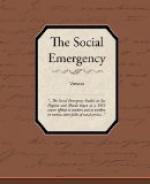This far-reaching change in the customs of society is fraught with immediate dangers, because we do not know whether the mere knowledge of facts concerning sexual processes, vices, and diseases will do a given individual harm or good. The effect of such information upon any person is unquestionably determined by his physiological age, by his nervous system, by the manner and time of the presentation of the subject; above all, by his will power and the controlling ideals that are acquired along with scientific facts. As yet, we have not discovered thoroughly trustworthy pedagogical principles, administrative methods, and printed materials for public education in matters of sex. So difficult and complicated are the problems, and so disastrous are mistakes in this field of instruction, that the home, the church, and the school—the institutions to which young people should naturally look for truth in all matters, the agencies best qualified to solve the problems—are extremely cautious and conservative. While these agencies, which are concerned primarily with the welfare of the individual, the family, and society, have made some efforts to solve the problems, and to discover a safe and gradual transition from the old order to the new, other agencies, concerned primarily with making money, have rushed in to exploit the new freedom and the universal interest in matters of sex. This passing of the old order, and the invasion of the new order before we are prepared for it, constitute the social emergency of the twentieth century. Great as are the industrial and political revolutions of modern times, it is doubtful if anything so deeply concerns the coming generations as our measure of success in confronting the present social emergency.




